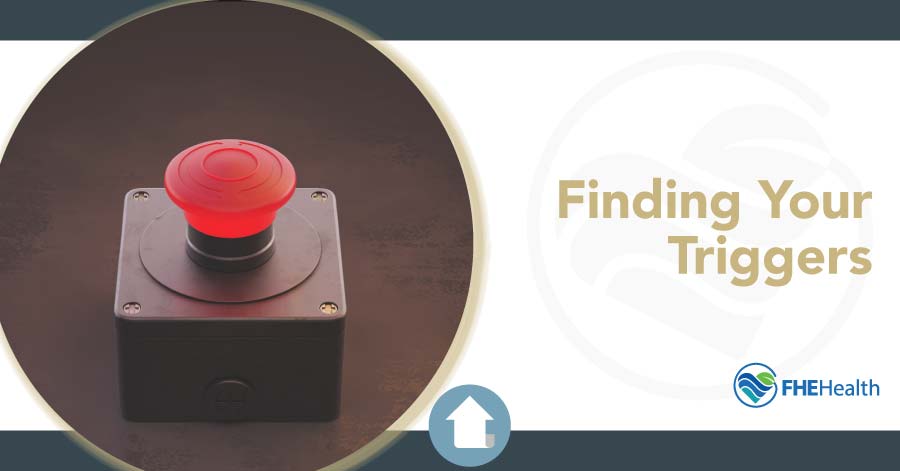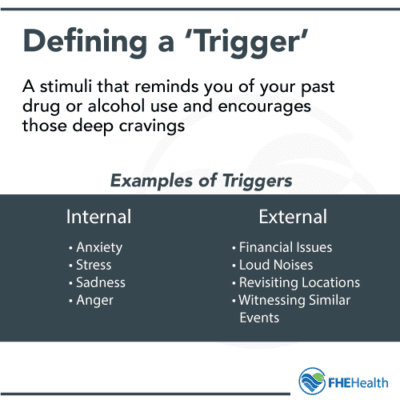
Do you have an addictive trigger? It’s something that makes you want to use drugs even though you’re sober. Most people in substance use recovery have more than one trigger. Understanding what they are, how to recognize the signs and how to stop them from leading you down a relapse path is essential to your long-term recovery.
What Is an Addiction Trigger?
 Alcohol and drug addiction triggers are stimuli that remind you of your past drug or alcohol use and encourage those deep cravings. They can be social triggers, environmental triggers or emotional situations. Because 40–60% of people in drug and alcohol rehab relapse, according to the National Institute on Drug Abuse, it’s critical to spot any instance in which you’re at a higher risk for using, and then take preventative action.
Alcohol and drug addiction triggers are stimuli that remind you of your past drug or alcohol use and encourage those deep cravings. They can be social triggers, environmental triggers or emotional situations. Because 40–60% of people in drug and alcohol rehab relapse, according to the National Institute on Drug Abuse, it’s critical to spot any instance in which you’re at a higher risk for using, and then take preventative action.
How Does This Trigger a Relapse?
Triggers are cues for the brain. When you were using drugs, you created routines. These routines may have included specific people, places or experiences.
The brain links those routines and experiences with drug use. When you’re once again exposed to those things, during your recovery and after detox, the brain brings back that association with drug use. You suddenly feel a craving that’s very hard to ignore.
Are There Mental Health Triggers?
When asking what are triggers in addiction, you also have to consider the triggers that impact mental health. These are internal or external experiences that remind you of mental health trauma or breakdowns.
A good example of mental health triggers occurs in people with post-traumatic stress disorder. In this mental health disorder, a person may relive experiences and traumatic events when they hear a specific sound or walk into a room where the trauma occurred.
Military veterans, for example, may develop PTSD while oversees. Fireworks back home may trigger an emotional response because the fireworks sound like gunshots.
Mental health and addiction relapse triggers can be internal, such as emotion-based triggers, and external, such as those brought on by sights, smells and locations.
Internal Triggers
Most of the triggers people experience are internal triggers. These are emotions or thought patterns that lead to strong cravings to use drugs or alcohol. This mental health and addiction trigger list offers some insight into common internal triggers:
- Anxiety
- Stress
- Feelings of sadness
- Feeling alone or abandoned
- Feeling frustrated or overwhelmed
- Anger
- Pain
- Tension
Internal triggers can occur for many reasons, or no reason at all. When they occur, they bring a desire to use.
External Triggers
External triggers are things around you, such as cues within your environment that may bring up memories or experiences related to drug or alcohol use. They can also be factors that make you relive experiences in some way. Common external triggers include:
- Locations where you used or experienced trauma
- Loud noises that remind you of the trauma
- Anniversary dates of previous occurrences
- A person you used with
- Family relationships
- Financial problems
- Ending of a relationship
- Witnessing violence
- Sexual harassment
- Crowded places
- Smells
- News stories related to impactful events
It’s possible for any external trigger to happen without you being aware of the event that caused it. For example, visiting a family member’s home may make you uncomfortable, but you don’t know why. Years later, you may work with a therapist to uncover the abuse that occurred there.
How to Identify a Trigger
 Triggers are not always easy to pinpoint. Generally speaking, they’re anything that causes you to want to use drugs or alcohol or make you feel the signs of your mental illness, such as panic attacks or bouts of depression.
Triggers are not always easy to pinpoint. Generally speaking, they’re anything that causes you to want to use drugs or alcohol or make you feel the signs of your mental illness, such as panic attacks or bouts of depression.
Common Triggers
Some types of triggers are commonly found across most people in the recovery population. The most common trigger is experiencing the presence of a drug or alcoholic drink.
For example, someone in recovery from heroin addiction who is suddenly exposed to the substance during a visit to a friend’s home is at a very high risk of experiencing a trigger. Just the sight or smell of the substance can create deep, hard-to-stop thoughts of using.
Other common triggers may include exposure to people or places familiar with that experience. Stress is another common trigger. Struggling with finances, family or other stressful situations can bring back the intense need to use as a way to soothe those thoughts and feelings and to feel good for a few moments.
Unique Triggers
Addiction cravings and triggers can be very specific to you. Consider your risk factors, things that make you uneasy.
A specific person or place may be a trigger. The sound of machinery, the scent of a specific flower or the preparation of a specific type of food could be a trigger for you.
Make a list of anything that creates a deep emotional tie. List anything that makes you think about using, but also things that create strong levels of stress and frustration.
You may also respond to certain people or events in ways that don’t seem normal. That can be an indication of an underlying trigger that you haven’t uncovered yet.
How Facing Your Triggers Can Prevent Relapse
Drug addiction triggers are very powerful. In a moment’s time, you may feel overwhelmed and simply unable to pull yourself together.
When you’ve worked this hard to get into rehab, through detox and onto recovery, you don’t want triggers to have so much control over your future. That’s why many therapists and counselors recommend facing your triggers.
Numbing Yourself – Exposure
One of the routes is numbing yourself to triggers. Instead of simply walking away from the risk, you face it. You experience it so much and so often that it seems to lose its grip on you.
By numbing yourself to that risk through exposure, you may be able to defeat it. You are working on reprogramming your mind to break the association between the experience and the drug itself.
If you choose to go this route, be sure you’re doing so with the help of your counselor. For this type of numbing method to work, you must abstain from using the drug or drinking the alcohol.
As noted, though, this is very hard when a trigger is present. You don’t ever want to put yourself in this type of experience alone, especially without having tools or strategies for overcoming the way triggers make you feel.
Reconstructing Your Life
The opposite of numbing yourself is reconstructing your life in some way to eliminate those triggers. That may be possible to do with some triggers.
You don’t want to expose yourself to the people or the substances themselves, for example. Removing those exposure risks may be good for most people.
When it comes to making changes to your life to remove triggers, be realistic. There’s no way to prevent fireworks from occurring or certain words from being spoken around you.
It’s valuable to work with your therapist to learn ways to manage your triggers in a healthy manner. This could include cognitive behavioral therapy, a method of learning how to change negative thoughts so you don’t relapse. Your therapist can help you determine the best practices for managing your triggers.
Seek Help for Addiction Triggers from FHE Health
Every person with an addiction is at risk of relapse, but with a team of dedicated counselors, you can learn strategies for improving your odds of maintaining sobriety. Let FHE Health help you with ongoing support and care. Contact our compassionate counselors now at (833) 596-3502 for immediate help, 24/7, if you are at risk of using right now.






